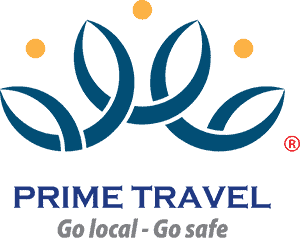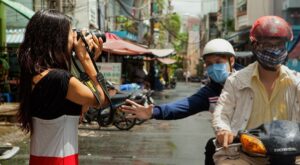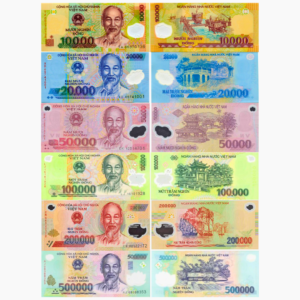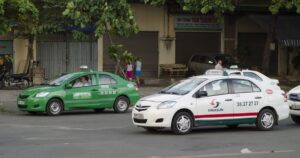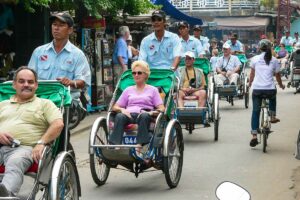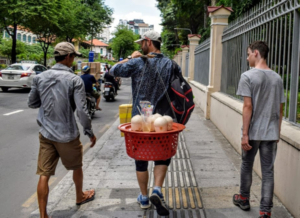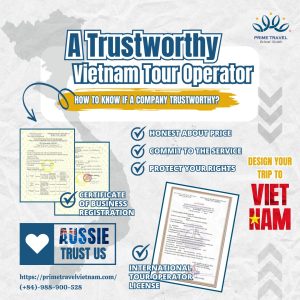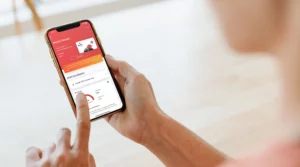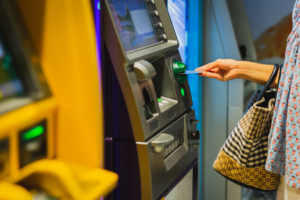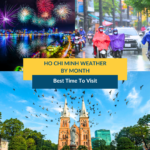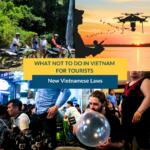
Vietnam Travel Scam Alert 2025: Top 15 Common Scams And How To Avoid
You may wonder “Is Vietnam safe to travel?”. Vietnam is generally considered a safe country for tourists, renowned for its friendly people, stunning landscapes, and delicious cuisine. However, like any popular travel destination, it’s not without its share of petty crime and travel scam.
While violent crime is relatively rare, travelers should be aware of common Vietnam scams and take necessary precautions of potential travel scams.
Prime Travel’s guide highlights the top 15 Vietnam scams to watch out for in 2025, offering practical tips to help you avoid scam and make the most of your Vietnam adventure!
Vietnam Travel Scam Alert 2025: Top 15 Common Scams And How To Avoid
Petty Theft
While not technically a travel scam, it’s a practice to be aware of. Pickpocketing is common in crowded areas like markets, tourist attractions, and public transportation. Pickpockets often work in teams, with one distracting you while another steals your belongings. Also, especially in Ho Chi Minh city, motorbike riders snatch bags, phones, cameras from pedestrians, often targeting those walking near the curb.
How to avoid scam
To minimize the risk of theft, secure your valuables by using a money belt, hidden pouch, or a bag that’s difficult for thieves to access. Never keep your wallet in your back pocket, and avoid displaying expensive jewelry, watches, or electronics in public. Bring small and enough amount of money. When you’re not using them, store valuable items in your hotel safe.
Currency Exchange Scam – Fake or Inflated Prices
Currency exchange services, particularly those targeting tourists at airports or popular destinations, can sometimes be deceptive. While they may advertise “no commission,” the real issue lies in two potential problems: First, even if they don’t explicitly charge a commission, they might offer a very poor exchange rate, effectively taking a hidden fee. It’s crucial to check current exchange rates from a reliable source to ensure you’re getting a fair deal.
Second, and even more concerning, they might give you counterfeit currency or outdated bills that are no longer valid in Vietnam. You should heed the scam alert inspect any exchanged money carefully.
How to avoid scam
For secure currency exchange, banks are the safest bet, even if their rates aren’t the absolute best. Vietnamese banks like Agribank, Vietcombank, Techcombank, BIDV, Maritime Bank, Vietinbank, VIB, VP Bank, MB Bank, and ABC offer competitive exchange rates, though they can vary. Checking their websites beforehand is recommended.
However, bank exchanges can involve paperwork and procedures. Using international debit or credit cards is a convenient alternative, eliminating the need for currency exchange altogether. Explore our blog A Smart Traveler’s Guide to Exchange Money in Vietnam to discover best places to exchange money in Vietnam.
Fake money are often made from lower-quality paper. When crumpled, they may stay wrinkled, feel softer, or even tear easily. While this is a quick test, always check other security features like watermarks, holograms, and color-shifting ink to be sure. Stay alert and verify your cash!
Money – Switching Scam
Be careful with Vietnamese currency, as the 10,000 VND note can be easily mistaken for the 200,000 VND note, and the 20,000 VND and 500,000 VND notes also look very similar. A common travel scam involves someone switching your 500,000 VND note for a 20,000 VND note while you’re paying.
This can happen anywhere, but it’s particularly prevalent with motorbike or taxi drivers who can quickly leave. They use sleight of hand to swap your larger bills for smaller ones and then feign outrage, accusing you of trying to cheat them.
How to avoid scam
To avoid money-changing scams, pay close attention to your cash during transactions. The key is to carry small bills and pay the exact amount. Small vendors often genuinely lack change, especially for large bills, so break larger denominations at reputable businesses like convenience stores or restaurants as soon as you can.
Taxi Scam
Be especially cautious at airports, train stations, and tourist attractions, where taxi scams are common. Many taxis aren’t metered, despite appearing to be, and some drivers will claim their meter is broken when it’s simply switched off. Even if the meter is running, it might be rigged to inflate the fare. Drivers at these locations are also known to use the money-switching scam or take longer routes to increase the cost.
Don’t be fooled if a driver shows you a Grab price on their phone – it’s likely the most expensive “VIP” option. Adding to the confusion, some taxi services mimic the color schemes of reputable companies, making them hard to distinguish.
How to avoid scam
It’s best to avoid unofficial taxi, freelance taxi that often operate without proper licenses or regulations. While some drivers might offer tempting discounts, it’s safer to ignore them. Calling reputable taxi companies directly is a good option.
Vinasun (white in color) and Mai Linh (green in color) are two well-known and reliable companies. For the most convenient option, especially if you want to know the fare upfront, use ride-hailing apps like Grab, Be, or Xanh SM (electric vehicles).
Cyclo/Motorbike Taxi scam
In popular tourist destinations like Hanoi, Da Nang, Hoi An, and Ho Chi Minh City, cyclos and motorbike taxis (called “Xe Om”) offer a unique way to explore the narrow streets. However, these modes of transport can also be a source of travel scam.
While agreeing on a price beforehand is standard practice, some drivers may try to inflate the fare after the ride, perhaps by adding an extra zero, claiming you misheard the agreed-upon amount. With no witnesses, it becomes difficult to dispute their version of the story.
Another common tactic is for the driver to take you far out of your way and then demand an crazy fee to return you to your destination.
How to avoid scam
If you’d like to experience a motorbike or cyclo ride, be sure to agree on the fare beforehand. To avoid cyclo scams, either use your phone’s map to track the route or book a tour through a reputable company. Booking online also eliminates the hassle of haggling.
For motorbike taxis, the safest and most transparent option is to use the Grab app, which lets you confirm the price before you ride. However, be aware that some Grab drivers may drive recklessly.
For a truly immersive and safe experience, consider a motorbike tour with a knowledgeable and experienced guide from Prime Travel. They can lead you to hidden gems and local food stalls, offering a unique perspective on the city.
Explore More >>> How to travel in Vietnam: A Traveler’s Guide to Transportation
Local Vendor Scam
Exploring Vietnam’s streets, particularly Hanoi’s Old Quarter, you are likely to encounter vendors balancing baskets of fruit or coconuts on their shoulders. These picturesque scenes can be tempting photo opportunities, but be aware of a common travel scam.
Vendors may offer to let you take photos of them, or even encourage you to pose with their traditional bamboo poles, claiming it’s free, but then demand payment after the picture is taken.
In another version, they start preparing the fruit or coconuts while you’re taking photos, then insist you buy them at an inflated price, claiming they did it for you. In both cases, what seems like a friendly photo opportunity quickly turns into a costly travel scam.
Other scam involves overcharging for local fruits and snacks like banh ran (glutinous rice balls). Vendors may aggressively demand payment, sometimes even taking money directly from your pocket.
How to avoid scam
The best way to avoid this photo scam is to simply say no and avoid eye contact with the vendors, no matter how impressive their displays or balancing skills seem. Additionally, ưsing a hand gesture to decline is even more effective than speaking. Be careful when handling money and don’t put all money in one place.
Begging Scam
Walking the streets of Hanoi or Ho Chi Minh City, you might encounter individuals who seem to be struggling, perhaps dressed in worn clothing and appearing vulnerable. It’s understandable to want to help.
However, organized begging groups operate in Vietnam, particularly in tourist hotspots. These groups sometimes use children, especially in Sapa, which can prevent them from attending school. Also, for the children’s well-being, it’s best not to give them sweets in Sapa, where dental care is often expensive and hard to find in Sapa.
How to avoid scam
When encountering beggars, especially in tourist areas, it’s often best to avoid direct eye contact. If you wish to help, consider donating to reputable organizations like the Red Cross, ActionAid Vietnam or Blue Dragon Children’s Foundation, which support long-term solutions for those in need.
Shoe Shiner Scam
As one of common Vietnam scams, when in Hanoi’s Old Quarter and Ho Chi Minh City’s District 1, be wary of aggressive shoe shiners. They often target tourists walking or sitting outside, suddenly pointing at their shoes and offering a shine or repair at a quoted price, despite any attempts to decline. Some have even been known to remove shoes without permission and then demand an exorbitant fee, knowing the tourist is unlikely to walk away barefoot.
Then, the price can drastically increase after the service is performed, often doubling (claiming the initial quote was per shoe) or even higher. Note that normal price for locals is 20,000 VND/pair (less than US$1)
How to avoid scam
The most effective way to avoid shoe-shining scams in Vietnam is keep walking when approached. While it seems rudes but this prevents them from grabbing your shoe and starting the scam.
Copycat Businesses and Unlicensed Businesses
Protect yourself from copycat travel companies in Vietnam. It’s common to find multiple businesses operating under similar names and logos, often deliberately mimicking well-known brands.
These often unlicensed operators lure tourists with promises of high-quality service, but the reality can be very different. Imagine booking a sleeper bus with advertised amenities, only to find they don’t exist. These companies may also use unlicensed guides who take tourists to commission-earning shops or pressure them for tips.
Prime Travel Vietnam takes a different approach. We employ only licensed guides, paying them among the highest wages in the country, guaranteeing they will never ask for tips.
Legally licensed tour operators in Vietnam are required to deposit 250,000,000-500,000,000 VND into a government-verified insurance fund for emergencies—a crucial safeguard that unlicensed operators often lack. At Prime Travel Vietnam, we maintain a government-verified insurance fund for your peace of mind and provide a safety guidebook to every customer.
How to avoid scam
Reputable operators will readily provide their official business registration number and international tour operator license. Visit the VNAT website and use their search function to verify the legitimacy of the operator’s license details.
If a tour seems suspiciously cheap, it probably is. Legal operators have to meet specific standards, which are reflected in their pricing. Be wary of operators who pressure you into booking immediately or offer deals that seem too good to be true. If an operator is hesitant to provide essential details like license numbers or itineraries, walk away.
Plus, don’t forget to check online reviews to see what other travelers have experienced.
Explore More >>> 5 Steps to find the best Vietnam tour operators for your trip
Accommodation Scam
A common hotel scam involves booking a seemingly perfect hotel online, only to discover upon arrival that it’s a run-down property in an inconvenient location, often disguised by fake online reviews.
If you’ve already paid, they’ll likely refuse any refund, citing the standard “images are for illustrative purposes only” disclaimer. Another tactic is padding the bill at checkout with charges for services you didn’t use. Disputing these charges can be difficult, as you often lack concrete proof to deny them.
How to avoid scam
Before booking a hotel, research thoroughly by checking various travel forums for genuine reviews and double-checking any information you find. Once you’ve chosen a hotel, contact them directly to clarify their terms and conditions. A hotel with transparent and readily available policies is usually a good sign.
For guaranteed quality and peace of mind, book our package. We only partner with accommodation suppliers that meet our high standards for safety and quality.
Local Restaurant/Cafe Scam
Protect yourself from inflated restaurant bills, a travel scam that can happen anywhere but is prevalent in tourist areas of Vietnam. Never sit down at a restaurant without clearly displayed prices on the menu. Ordering without knowing the fixed prices gives the staff the opportunity to charge you rip-off amounts.
Notes: It’s worth noting that some travelers have reported a “free peanut” scam when ordering drinks, particularly beer. While it may seem like a freebie, it is standard practice in Vietnam, even for locals that these snacks, along with wet wipes, often come with a small charge. It’s not a scam; it’s just a common custom.
How to avoid scam
A good starting point is to seek out well-reviewed and popular restaurants, especially those frequented by locals. A busy restaurant is often a good indicator of quality. To avoid overpaying, do some observation. Checking the menu prices or discreetly noting what locals pay for similar dishes will help ensure you’re charged a fair price.
Explore More >>> Food safety: Guide to Vietnamese Street Food for travelers
Shopping Scam – Fake Items
Shopping in Vietnam is a must-do, with prices often incredibly tempting. However, it’s essential to be aware of a potential travel scam. A frequent tactic is selling counterfeit goods as genuine articles.
If the price is incredibly cheap, assume it is a replica, regardless of the seller’s claims. This applies to both branded items and the materials themselves; for example, what appears to be leather might be fake, or cheap The North Face jackets in Hanoi’s old quarter.
How to avoid scam
Stick to established shops and malls and avoid buying from street vendors or small, unverified shops, especially for high-value items. Reputable stores are less likely to sell fakes and offer better customer service.
Explore More >>> Shopping In Hanoi – Top 25+ Local Gifts And Tips To Buy Local
SIM Card Scam
SIM cards are readily available throughout Vietnam, even at small corner stores, and often come with attractive data and text packages. Purchasing one is usually a simple, no-hassle process of registration.
However, a common SIM card scam involves these small stores buying SIM cards in bulk and then selling them to tourists at inflated prices. While this markup might seem like standard business practice, the problem is that the SIM card’s validity period often begins before it’s sold to the traveler.
So, a “30-day unlimited data” plan might actually have far fewer days remaining, and some travelers have reported SIM cards ceasing to function after only a few days of use. This scam also operates at airports.
How to avoid scam
For extended stays in Vietnam, purchasing a SIM card directly from an official telecom provider is the most reliable way to avoid inflated prices and potential Vietnam scams.
For shorter trips, an eSIM is a convenient and cost-effective alternative. This approach ensures you get a fair price and avoid any markup. Learn more on our blog Essential Guide To Vietnam SIM Card For Tourists (Physical And Esim).
Tinder Scam
As one of the common Vietnam scams, women on dating apps like Tinder, Bumble lure unsuspecting travelers to bars or clubs, promising a good time. However, these venues pressure the tourists into purchasing overpriced alcohol, with the women receiving a commission on each sale.
How to avoid scam
This scam preys on those unfamiliar with local customs and language. Avoid meeting up at a bar or club unless you fully trust the person, and never feel obligated to buy anything you don’t want. If you suspect a scam, trust your instincts and leave the situation safely and quickly. Reporting the incident to local authorities or the app’s support team is also recommended.
ATM Skimming
ATM skimming, a global problem, is also a risk in Vietnam, where cash is widely used and ATM visits are frequent. Unbeknownst to you, that seemingly secure ATM you just used might have a skimmer installed, capturing your card details.
How to avoid scam
To protect yourself from ATM skimming, choose your ATMs carefully. Prioritize ATMs located in secure, monitored environments like banks, where staff, cameras, or security guards are present. If you must use an ATM in a less secure location, thoroughly inspect the card reader and keypad for anything suspicious, including giving them a gentle tug to check for tampering.
What To Do If You Are Scammed
Being scammed while traveling can be a stressful experience, but staying calm and taking the right steps can help mitigate the situation. If you find yourself a victim of Vietnam scams, remember these key actions:
- Stay Calm: It’s natural to feel frustrated or angry, but try to remain calm. This will help you think clearly and make rational decisions.
- Assess the Situation: Determine the extent of the scam and what you’ve lost. Is it a small amount of money, or something more significant?
- Gather Evidence: If possible, collect any evidence related to the scam, such as receipts, photos, or witness information. This can be helpful if you decide to report the incident.
- Negotiate (If Appropriate): In some cases, particularly with minor Vietnam scams, you might be able to negotiate a resolution with the other party. However, don’t put yourself in a potentially dangerous situation.
- Report the Scam: For more serious Vietnam scams, or if negotiation fails, report the incident to the local police. While they may not always be able to recover your losses, a police report is often necessary for insurance claims.
- Contact Your Embassy/Consulate: If you’ve lost a significant amount of money or are in a difficult situation, contact your embassy or consulate for assistance. They can provide guidance and support.
- Inform Your Bank/Credit Card Company: If the scam involved your credit card or bank account, notify your financial institution immediately to prevent further unauthorized transactions.
- Document Everything: Keep a record of all interactions, including police reports, embassy contacts, and any other relevant information. This documentation will be useful for insurance claims and any follow-up actions.
- Share Your Experience (Cautiously): Sharing your experience online can help warn other travelers about potential Vietnam scams. However, be mindful of defamation laws and stick to the facts.
Is It Worth Visiting Vietnam With These Issues?
Yes, absolutely. Vietnam offers incredible sights and experiences, but like many developing countries, it also has its share of Vietnam scams. While these situations can be frustrating, they’re often a part of the travel experience and can even be humorous to look back on.
While no destination is perfect, the positive aspects of Vietnam far outweigh these minor inconveniences. For a worry-free and seamless trip, consider booking Vietnam tours with Prime Travel.
Explore More >>> Travel Safe in Vietnam: Crime and Safety Tips for Tourists
